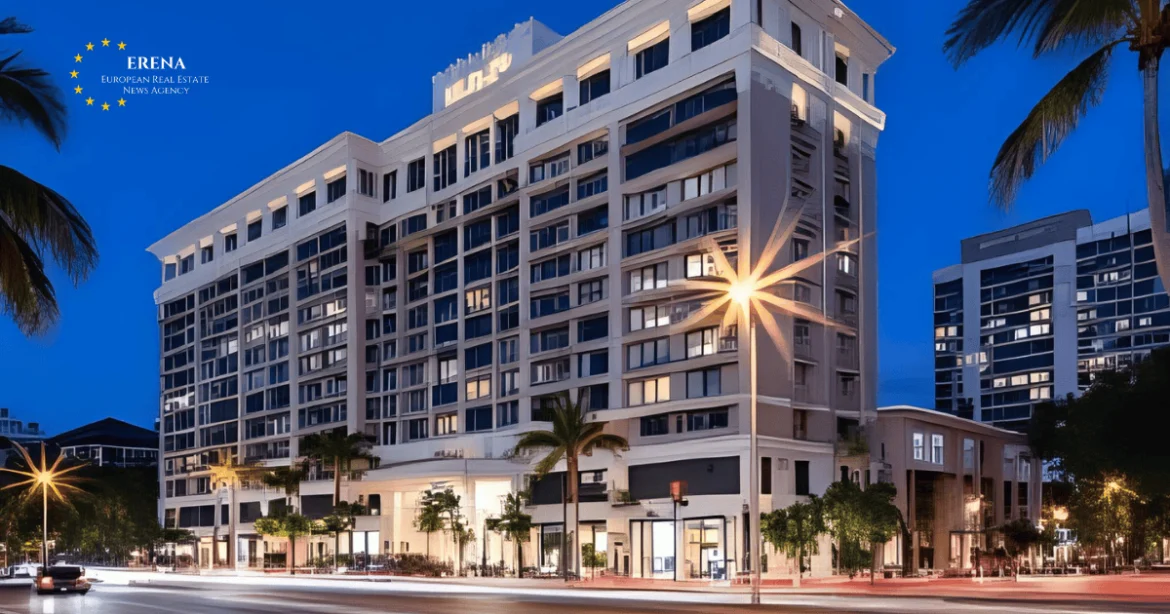Miami Gardens has witnessed a transaction that stands out in Florida’s real estate and hospitality sector: the AIDS Healthcare Foundation (AHF), a Los Angeles–based nonprofit, has acquired the 217-room Stadium Hotel for $24 million (≈€21.8 million). The deal was executed in full cash, without any bank financing, setting it apart in a market where leveraged acquisitions dominate. For both investors and urban developers, this transaction marks a rare and symbolic move with potential long-term effects.
Strategic Location Near Global Events Hub
The Stadium Hotel is strategically positioned along Northwest 27th Avenue, directly adjacent to Hard Rock Stadium. This venue hosts some of the world’s most high-profile events: NFL games, Formula 1 Miami Grand Prix, concerts by international artists, and in 2026, several FIFA World Cup matches. Such an environment guarantees robust demand for hospitality infrastructure, both in the short and long term. For a nonprofit like AHF, the acquisition not only secures a valuable asset but also opens opportunities for innovative use cases tied to community impact.
The hotel’s location also benefits from major transportation links, ensuring accessibility for visitors arriving from across South Florida. This connectivity adds to the property’s competitive advantage, especially as Miami Gardens seeks to strengthen its profile as a global events destination.
Why the All-Cash Model Stands Out
In the United States hospitality industry, all-cash transactions of this scale are exceedingly rare. Most hotel deals involve significant leverage, often through syndicated bank loans or private equity financing. By eliminating debt, AHF has positioned itself to operate with complete independence, without exposure to rising interest rates or refinancing risks.
This financial strategy also signals confidence in the long-term prospects of Miami Gardens. Without bank oversight, AHF gains flexibility in how it will manage or repurpose the property — whether as a traditional hotel, a hybrid conference and event center, or a venue for social and community programs. Transparency in financing further underscores the nonprofit’s intent to build trust with both local stakeholders and international observers.
The Nonprofit Factor: Beyond Conventional Hospitality
What sets this transaction apart is not just the financing structure but the identity of the buyer. AHF is a nonprofit best known for its global work in HIV/AIDS prevention, treatment, and advocacy. Its entry into the hospitality sector, especially through such a large cash deal, raises questions — and opportunities — about how nonprofits can engage in commercial real estate.
Possible uses extend beyond traditional hospitality:
-
Conventional hotel operations: maintaining lodging services for visitors to major events.
-
Community programs: hosting educational, cultural, or health initiatives within part of the property.
-
Hybrid functions: blending conference space, nonprofit events, and tourism accommodations.
Such a model could inspire other nonprofits to consider real estate ownership as a means to combine financial sustainability with mission-driven activities.
Comparing Florida’s Hotel Market
The Miami Gardens deal looks even more exceptional when compared to other recent Florida hotel transactions:
| City | Property Type | Amount (€) | Buyer | Notes |
|---|---|---|---|---|
| Miami Beach | Luxury hotel | €85M | Investment consortium | Bank-financed acquisition |
| Orlando | Hotel portfolio | €140M | Private investment firm | Portfolio of three properties |
| Fort Lauderdale | Resort hotel | €50M | Developer | Conversion into a resort |
| Miami Gardens | Mid-scale hotel | €21.8M | Nonprofit organization | 100% cash, debt-free deal |
Unlike the other transactions, where private investors pursued profit-driven models, the Miami Gardens purchase introduces a nonprofit ownership structure, opening the door for nontraditional uses.
Economic and Social Impact
The implications of this acquisition are substantial for Miami Gardens:
-
Job retention: The hotel will continue to operate, keeping its staff employed and potentially expanding its workforce.
-
Tourism reinforcement: With Hard Rock Stadium attracting millions of visitors annually, steady demand for lodging will support the property’s performance.
-
Urban branding: The high-profile deal positions Miami Gardens as a serious player in Florida’s hospitality investment map.
Expert Commentary
Suraj Dalal, partner at Kabani Hotel Group and one of the brokers involved in the sale, noted:
“The asset generated strong international interest from various groups such as European institutional investment firms, showcasing the demand of the South Florida market. The buyer secured the deal through an all-cash offer which came around 20 percent above the hospitality offers and closed in under 75 days.”
Ahmed Kabani, CEO of Kabani Hotel Group, added:
“This transaction reflects renewed optimism in the market and shows that with the right connections and execution, even complex deals can close smoothly and above expectations.”
These comments highlight both the competitiveness of South Florida’s hospitality sector and the unusual nature of an all-cash nonprofit purchase.
A Precedent for Future Models
This deal could set a precedent in several ways:
-
Nonprofit participation in real estate: It demonstrates that mission-driven organizations can play a role in commercial property markets.
-
Debt-free structures: The model may appeal to investors seeking transparency, independence, and long-term stability.
-
Community integration: By combining hospitality operations with social initiatives, the property could evolve into a hybrid model that benefits both visitors and residents.
Outlook: Profitability Meets Purpose
Looking ahead, the Stadium Hotel acquisition positions Miami Gardens at the intersection of tourism growth, real estate innovation, and community development. With the FIFA World Cup 2026 on the horizon, demand for quality accommodations will intensify. If AHF leverages the property both as a hotel and as a community platform, it could redefine how hospitality assets serve society.
The €21.8 million all-cash deal is thus more than a headline-making purchase. It symbolizes a shift toward new ownership models, where profitability and social impact coexist. As Miami Gardens continues to evolve as a global events hub, this acquisition stands as a signal of transformation — not only for the city but also for the broader hospitality and nonprofit landscapes.

